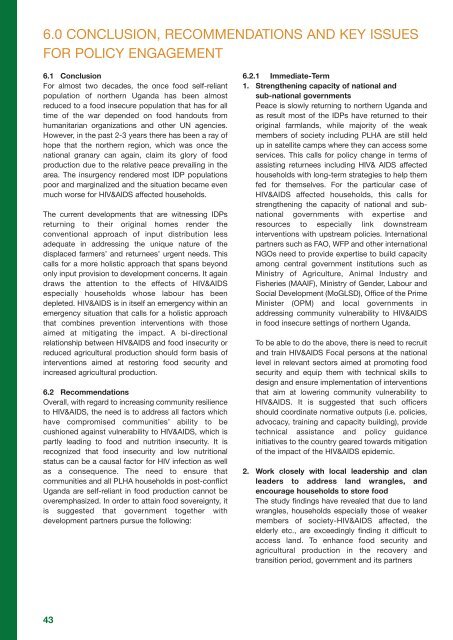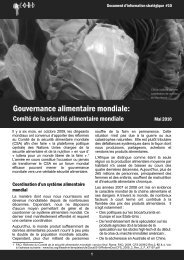Uganda Report 2012 FINAL PO:Layout 1 - ACORD
Uganda Report 2012 FINAL PO:Layout 1 - ACORD
Uganda Report 2012 FINAL PO:Layout 1 - ACORD
You also want an ePaper? Increase the reach of your titles
YUMPU automatically turns print PDFs into web optimized ePapers that Google loves.
6.0 CONCLUSION, RECOMMENDATIONS AND KEY ISSUES<br />
FOR <strong>PO</strong>LICY ENGAGEMENT<br />
6.1 Conclusion<br />
For almost two decades, the once food self-reliant<br />
population of northern <strong>Uganda</strong> has been almost<br />
reduced to a food insecure population that has for all<br />
time of the war depended on food handouts from<br />
humanitarian organizations and other UN agencies.<br />
However, in the past 2-3 years there has been a ray of<br />
hope that the northern region, which was once the<br />
national granary can again, claim its glory of food<br />
production due to the relative peace prevailing in the<br />
area. The insurgency rendered most IDP populations<br />
poor and marginalized and the situation became even<br />
much worse for HIV&AIDS affected households.<br />
The current developments that are witnessing IDPs<br />
returning to their original homes render the<br />
conventional approach of input distribution less<br />
adequate in addressing the unique nature of the<br />
displaced farmers’ and returnees’ urgent needs. This<br />
calls for a more holistic approach that spans beyond<br />
only input provision to development concerns. It again<br />
draws the attention to the effects of HIV&AIDS<br />
especially households whose labour has been<br />
depleted. HIV&AIDS is in itself an emergency within an<br />
emergency situation that calls for a holistic approach<br />
that combines prevention interventions with those<br />
aimed at mitigating the impact. A bi-directional<br />
relationship between HIV&AIDS and food insecurity or<br />
reduced agricultural production should form basis of<br />
interventions aimed at restoring food security and<br />
increased agricultural production.<br />
6.2 Recommendations<br />
Overall, with regard to increasing community resilience<br />
to HIV&AIDS, the need is to address all factors which<br />
have compromised communities’ ability to be<br />
cushioned against vulnerability to HIV&AIDS, which is<br />
partly leading to food and nutrition insecurity. It is<br />
recognized that food insecurity and low nutritional<br />
status can be a causal factor for HIV infection as well<br />
as a consequence. The need to ensure that<br />
communities and all PLHA households in post-conflict<br />
<strong>Uganda</strong> are self-reliant in food production cannot be<br />
overemphasized. In order to attain food sovereignty, it<br />
is suggested that government together with<br />
development partners pursue the following:<br />
6.2.1 Immediate-Term<br />
1. Strengthening capacity of national and<br />
sub-national governments<br />
Peace is slowly returning to northern <strong>Uganda</strong> and<br />
as result most of the IDPs have returned to their<br />
original farmlands, while majority of the weak<br />
members of society including PLHA are still held<br />
up in satellite camps where they can access some<br />
services. This calls for policy change in terms of<br />
assisting returnees including HIV& AIDS affected<br />
households with long-term strategies to help them<br />
fed for themselves. For the particular case of<br />
HIV&AIDS affected households, this calls for<br />
strengthening the capacity of national and subnational<br />
governments with expertise and<br />
resources to especially link downstream<br />
interventions with upstream policies. International<br />
partners such as FAO, WFP and other international<br />
NGOs need to provide expertise to build capacity<br />
among central government institutions such as<br />
Ministry of Agriculture, Animal Industry and<br />
Fisheries (MAAIF), Ministry of Gender, Labour and<br />
Social Development (MoGLSD), Office of the Prime<br />
Minister (OPM) and local governments in<br />
addressing community vulnerability to HIV&AIDS<br />
in food insecure settings of northern <strong>Uganda</strong>.<br />
To be able to do the above, there is need to recruit<br />
and train HIV&AIDS Focal persons at the national<br />
level in relevant sectors aimed at promoting food<br />
security and equip them with technical skills to<br />
design and ensure implementation of interventions<br />
that aim at lowering community vulnerability to<br />
HIV&AIDS. It is suggested that such officers<br />
should coordinate normative outputs (i.e. policies,<br />
advocacy, training and capacity building), provide<br />
technical assistance and policy guidance<br />
initiatives to the country geared towards mitigation<br />
of the impact of the HIV&AIDS epidemic.<br />
2. Work closely with local leadership and clan<br />
leaders to address land wrangles, and<br />
encourage households to store food<br />
The study findings have revealed that due to land<br />
wrangles, households especially those of weaker<br />
members of society-HIV&AIDS affected, the<br />
elderly etc., are exceedingly finding it difficult to<br />
access land. To enhance food security and<br />
agricultural production in the recovery and<br />
transition period, government and its partners<br />
43





